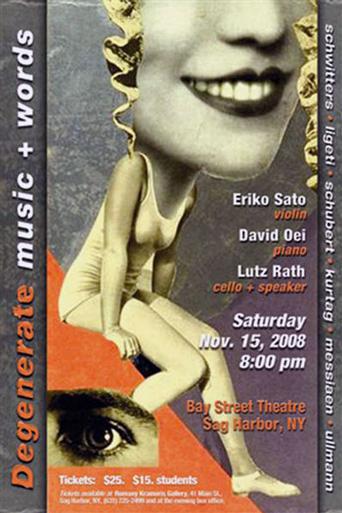
Of all the art forms available to dissidents for expressing their opposition to a political regime or a crushing culture, music seems the least likely option. Just how does one go about blasting the oppressor with music?
Performer, provocateur and world-renowned cellist Lutz Rath, who has made a study of this rather specialized branch of the musical repertoire, has answers, a few of which he will share with his audience this Saturday when he brings “Degenerate Music+Words” to Bay Street Theatre in Sag Harbor.
A highlight of the program Mr. Rath has in store is the German Dada artist Kurt Schwitters’s “Ur Sonate.” A “spoken absurd vocal tone poem,” as it has been described, the “Ur Sonate” has become something of a signature piece for Mr. Rath, who said in a recent telephone interview that he has performed it many times and developed “sort of a routine with it.”
How one develops a routine for a 45-minute monologue consisting entirely of vowels and consonants rhythmically strung together with not a single word is Mr. Rath’s secret, though the world has had ample opportunity to study his technique. Perhaps the most widely observed and over-the-top occasion was his performance of this composition, which is based on the German alphabet, from inside a glass box at a Manhattan gallery. His vocal contortions were piped out through speakers for the benefit of the midtown
rush-hour crowd.
With his deep, powerful voice and his high-energy performance style, Mr. Rath might have been drawn to this absurdist exercise for the sheer delight of exploiting both of those gifts to the fullest, but it is clearly the political implications of the piece, written between 1922 and 1932, that have placed it in his permanent repertoire.
It is thought that Schwitters, either consciously or subconsciously, was imitating the insanity of speeches in the early Nazi period. What he accomplished, in fact, was criticism without words or images, mocking mimicry that was a challenge to censor, though in the end Schwitters’s art was declared “degenerate” and banned from public viewing.
“It all has to do with censorship,” said Mr. Rath, “which is a very critical issue in the present time. That is why I’m doing it.”
In fact, Mr. Rath will not perform the entire 45-minute composition, which would, he conceded, “be a bit too much.” For his Bay Street audience, he has limited himself to part of the first movement.
Also on the program, for which Mr. Rath will be joined by violinist Eriko Sato and pianist David Oei, is Viktor Ullmann’s “The Way of Love and Death of the Cornet Christoph Rilke,” 12 poems by Rainer Maria Rilke for piano and speaker, which was Ullmann’s last composition in the Theresienstadt concentration camp. Additionally, the three musicians will perform compositions by the German Jewish composer Erwin Schulhoff, the French composer Olivier Messiaen, the “outsider” Hungarian Gyorgy Kurtag and Franz Schubert.
Franz Schubert?
In Viennese society, “he was regarded as an outsider,” said Mr. Rath. “That is why I have included him. He was such an eccentric and he associated with eccentrics.” Also, confessed Mr. Rath, “I wanted to give a bonbon to the audience.” The selection, a “glorious” movement from Schubert’s B-flat trio, is, he said, “to die for.”
When Mr. Rath returns to Sag Harbor from his current home in Weehawken, New Jersey, it will be a homecoming of sorts, and not just because he is familiar to Hamptons audiences, having performed in several venues—including the Old Whalers Church, where he presented a moving program of “Forbidden Music” a few years ago.
Mr. Rath was, in fact, a Sag Harbor resident for eight years before relocating to Weehawken, a 10-minute commute to the city where he plays regularly with the Orchestra of St. Luke’s, is chamber music concert director of the Washington Square Festival, and has many other professional commitments.
A citizen of the world, Mr. Rath grew up in Germany, moved to France and then came to this country.
“I moved more or less from war to war,” he said, offering an explanation for his interest in forbidden music. After leaving Germany, he arrived in France when that country was in the throes of the Algerian War, then left for the United States “at the height of the Vietnam War.”
With that background, he said, “my interest in music, in art, has always been a little bit politically and socially oriented.”
“Degenerate Music+Words” will take the stage at Bay Street Theatre in Sag Harbor at 8 p.m. on Saturday, November 15. Tickets are $25, $15 for students and are available at the Kramoris Gallery in Sag Harbor or at the Bay Street box office one hour before the performance.